How To Keep Chicken Coop From Smelling: My Own Experience
- February 9, 2024
- 0 comment
Starting a backyard chicken coop has been a journey filled with both challenges and successes, especially when it comes to keeping the coop clean and free of bad smells. I’ve tried a variety of methods and products, each with its pros and cons, and this trial and error has taught me a lot about what works to keep the coop smelling nice. I’m excited to share what I’ve learned with others who are interested in chicken keeping, to help them manage their coops better.
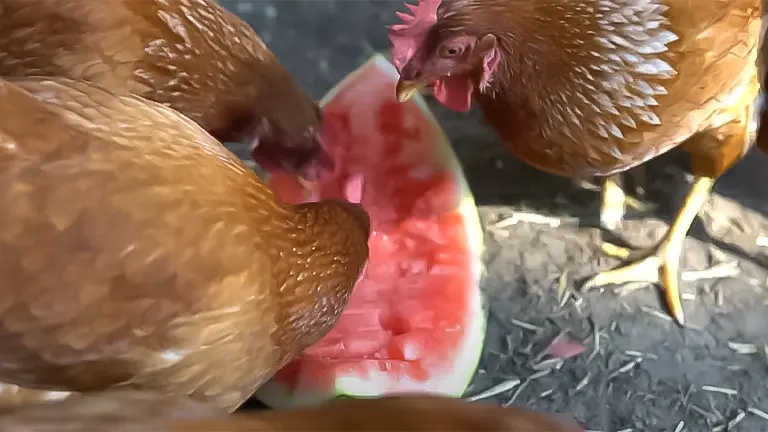
Dealing with smells is a normal part of taking care of animals, including chickens. However, I’ve found that it’s possible to effectively reduce and even eliminate bad smells from the coop.
The main problem is chicken poop, which is high in nitrogen. When it gets wet, it starts to produce ammonia, a gas that smells bad. The best way to prevent this is to keep the coop as dry as possible. By focusing on keeping moisture under control, we can prevent ammonia from forming and keep the coop smelling fresh. This approach is key to creating a healthy and pleasant environment for both the chickens and the people taking care of them.
List of How To Keep Chicken Coop From Smelling:
- Regular Cleaning and Maintenance
- Adequate Ventilation
- Choosing the Right Bedding
- Lime and Diatomaceous Earth
- Use Fresh Herbs In Sleeping and Nesting Areas
Understanding the Source of Smell
A smelly chicken coop usually indicates issues with how it’s managed, not just the fact that chickens are being kept. The main reasons for unpleasant odors include ammonia released from chicken feces, moisture in the bedding material, and poor air circulation within the coop.
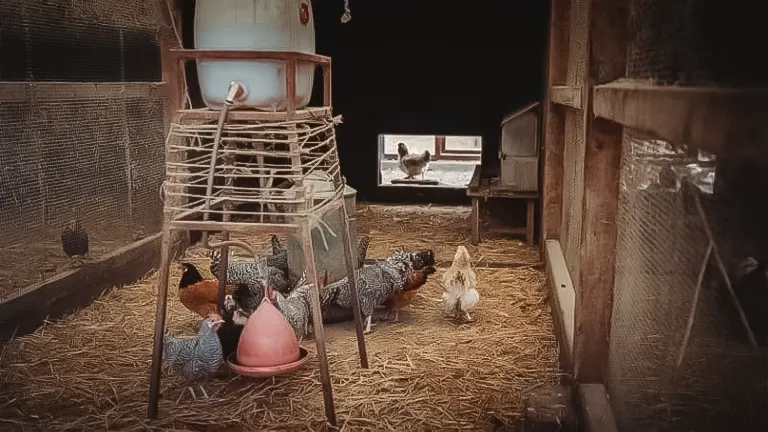
Ammonia, a potent gas that can cause strong odors, forms when chicken waste breaks down, especially in wet conditions. Wet bedding exacerbates this problem by providing an environment for ammonia and other odor-causing bacteria to thrive.
Additionally, without adequate ventilation, the air inside the coop becomes stagnant, allowing odors to accumulate and potentially harming the respiratory health of the chickens. Addressing these issues is crucial for maintaining a healthy and odor-free coop environment.
5 Strategies and Tools for a Fresh Coop
1. Regular Cleaning and Maintenance
Maintaining a clean chicken coop is critical for preventing unpleasant odors and ensuring the health of the chickens. A daily routine that includes removing chicken waste and stirring the bedding helps prevent the buildup of ammonia, a noxious gas that results from the decomposition of urine and feces.
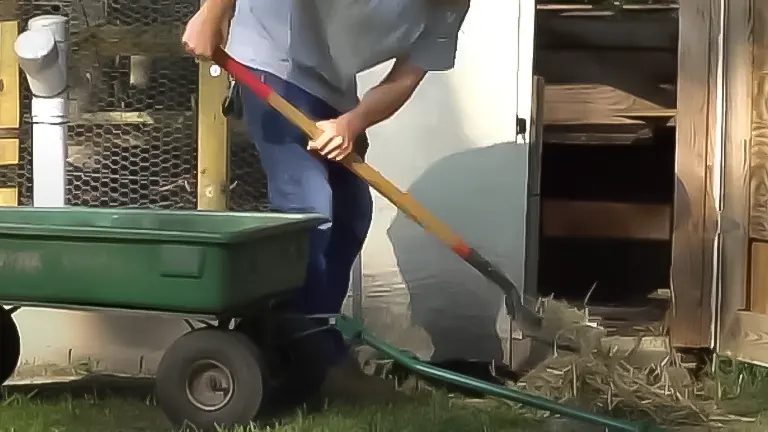
This simple, yet effective daily maintenance task plays a crucial role in keeping the coop’s environment fresh. In addition to daily maintenance, a thorough deep clean once a month is indispensable. During this deep clean, all bedding is replaced, and every surface within the coop is meticulously scrubbed.
This not only removes all traces of waste and dirt but also prevents organic matter from decomposing and emitting foul odors, ensuring the coop remains a clean, odor-free zone for the chickens.
2. Adequate Ventilation
The significance of proper ventilation in a chicken coop cannot be overstated. By installing additional vents and incorporating a small fan, I was able to dramatically improve the air quality inside the coop.
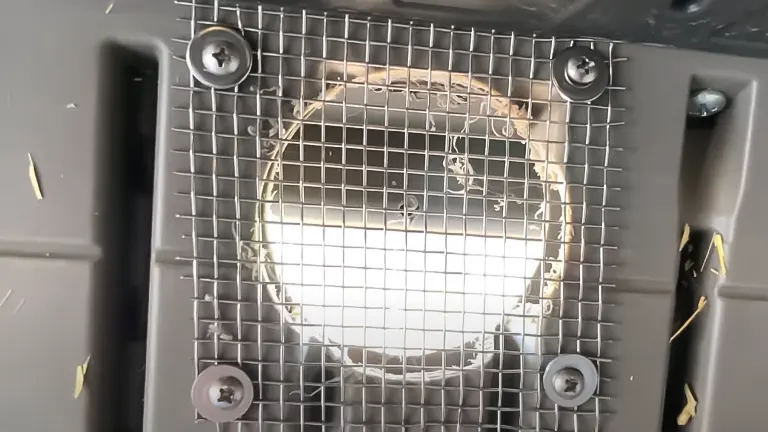
Fresh air circulation is vital for dissipating moisture and reducing the concentration of ammonia, both of which are key factors in controlling odor within the coop. Continuous airflow helps to maintain a dry environment, discouraging the growth of bacteria and the accumulation of harmful gases.
This not only aids in keeping the coop smelling fresh but also plays a significant role in safeguarding the respiratory health of the chickens, making it a healthier place for them to live.
3. Choosing the Right Bedding
Through trial and experimentation with various bedding materials, pine shavings have proven to be the most effective in managing coop odors and maintenance. Unlike straw, which can become a breeding ground for mold due to its moisture-retaining properties, or sand, which, although easy to clean, lacks insulation properties, pine shavings offer superior absorbency.
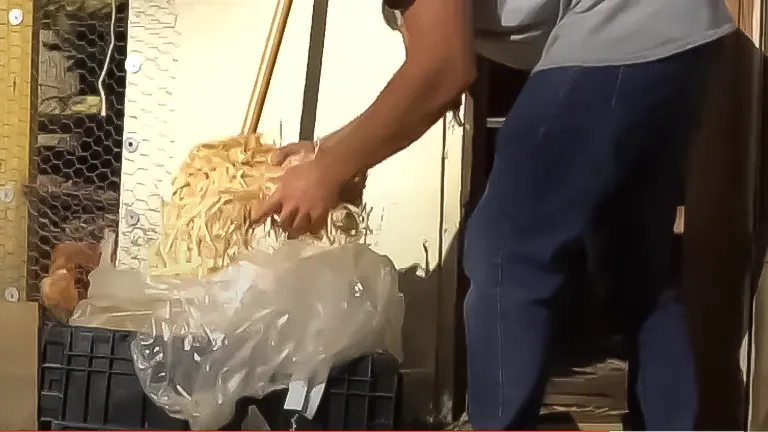
This key characteristic of pine shavings means they can quickly absorb waste and moisture, significantly reducing the likelihood of odor development. Moreover, pine shavings are easy to manage; they can be effortlessly turned over or replaced, simplifying the cleaning process and ensuring the coop remains an odor-free environment for the chickens.
4. Lime and Diatomaceous Earth
Utilizing agricultural lime and diatomaceous earth in the coop provides a dual approach to odor management and pest control. By applying a thin layer of agricultural lime directly onto the coop floor before adding new bedding, odors are neutralized through the lime’s moisture-absorbing properties, effectively reducing the presence of ammonia.

Diatomaceous earth complements this by being sprinkled over the bedding, where its natural pest-repellent qualities help in controlling the population of insects and mites, while its absorbent nature further aids in moisture control.
This combination not only ensures the coop remains dry and less appealing to pests but also significantly diminishes odor, creating a cleaner and more pleasant living environment for the chickens.
5. Use Fresh Herbs In Sleeping and Nesting Areas
Incorporating fresh herbs and rose petals into the chicken coop introduces a delightful, natural fragrance that enhances the overall environment for both the chickens and their keepers. Herbs such as mint are not only aromatic but also possess natural pest-repellent properties, offering a safe and effective way to deter pests while adding a refreshing scent to the coop.

This method is not only about maintaining a pleasant aroma; it also enriches the chickens’ environment by providing them with interesting textures and flavors to explore. As the chickens forage for these herbs and petals, they benefit from the added nutrition and variety in their diet, making this approach beneficial for their health and well-being.
Furthermore, the use of fresh herbs promotes a more natural and enjoyable living space, reinforcing the coop’s defense against odors and pests in a completely organic way.
Why Should Your Chicken Coop Smell Good?
Maintaining a good-smelling chicken coop is crucial not just for the comfort of people living nearby, but also for the health and well-being of the chickens themselves. A coop that smells bad is often a sign of ammonia build-up from chicken waste, which can harm the respiratory health of the chickens and increase the risk of diseases.
Moreover, controlling odors helps prevent the attraction of pests and rodents, which can carry diseases into the coop. Therefore, keeping your chicken coop smelling fresh contributes to a cleaner, safer, and more pleasant environment for both the chickens and their keepers.
Pros and Cons Based on Experience
- Regular Cleaning: The most effective method, but labor-intensive.
- Ventilation: Easy to implement and maintain, but initial setup requires some effort.
- Bedding Choice: Pine shavings offer the best performance but come at a higher cost compared to straw.
- Lime and Diatomaceous Earth: Effective for odor control and pest management, but requires careful handling due to their caustic and drying properties.
Related Articles:
- Best Bedding For Chickens
- Best Safe Chicken Coop Heater
- 8×8 Chicken Coop Plans
- Turning a Shed Into a Chicken Coop
- How to Make a Chicken Coop Out of Pallets
- Best Sand for Chicken Coop
- How To Insulate a Chicken Coop
- How To Heat a Chicken Coop
- How To Keep Water from Freezing in Chicken Coop
- How to Build a Chicken Coop
- How To Build Chicken Nesting Boxes
- How to Raise Happy and Healthy Chickens in Your Backyard
- When Can Chicks Go Outside? Timing and Tips for a Smooth Transition
- 12 Reasons why Ducks are Better than Chickens
- Best Automatic Chicken Coop Doors 2024: Expert Reviews & Buyer’s Guide
- Best Fans for Chicken Coop 2024: Effective Cooling Solutions Reviewed
Final Concluding
Based on my experience, the best strategy for keeping a chicken coop from smelling is a combination of regular cleaning, adequate ventilation, using pine shavings as bedding, and occasional use of lime and diatomaceous earth for moisture and pest control. This comprehensive approach addresses the root causes of odors, ensuring a healthy environment for your chickens and a more pleasant experience for you.
Every coop and situation is unique, so it’s important to experiment and find what combination of strategies works best for you. Remember, keeping a chicken coop smelling fresh is not only about comfort but also about the health and well-being of your feathered friends.
Frequently Asked Questions
- Why does my chicken coop smell bad?
The primary cause of bad smells in a chicken coop is the buildup of ammonia from chicken waste, which happens when urine and feces decompose. High moisture levels and poor ventilation can exacerbate this problem, leading to stronger odors. - How often should I clean my chicken coop to prevent odors?
For optimal odor control, it’s recommended to do a basic clean daily by removing feces and turning over the bedding. A thorough deep clean, including changing out all bedding and scrubbing the coop, should be done at least once a month. - What is the best bedding material to reduce coop smells?
Pine shavings are highly recommended due to their excellent absorbency and ease of cleaning. They help manage moisture effectively, which is key in controlling odors. - Can ventilation really help reduce odors in my chicken coop?
Yes, proper ventilation is crucial for removing moisture and ammonia gases from the air within the coop. Ensuring adequate airflow can significantly reduce odor problems. - How does moisture contribute to coop odors, and how can I control it?
Moisture allows bacteria and ammonia to thrive, which are primary contributors to coop odors. Keeping the bedding dry and ensuring good ventilation are effective strategies to control moisture levels. - Is it safe to use lime in my chicken coop for odor control?
Yes, agricultural (not hydrated) lime can be safely used on the coop floor before adding new bedding to neutralize odors and absorb excess moisture. However, it should be used sparingly and not come into direct contact with the chickens. - How does diatomaceous earth help in controlling coop smells?
Diatomaceous earth can help control odors by absorbing moisture and also acts as a natural pest control by deterring insects and mites that can contribute to unsanitary conditions. - Can fresh herbs really help keep my chicken coop smelling fresh?
Yes, adding fresh herbs like mint, lavender, and rosemary can help mask odors and provide a pleasant aroma. Some herbs also have pest-repellent properties, adding to the cleanliness of the coop. - What role does the diet of my chickens play in coop odors?
The diet can impact the smell of chicken waste. Avoiding foods that are high in sulfur, such as cabbage and onions, can help reduce the potency of the waste odor. - Are there any natural remedies for eliminating chicken coop odors?
In addition to using lime and diatomaceous earth, regular application of apple cider vinegar in water can help reduce odor-causing bacteria. Also, ensuring a balanced diet and clean water for your chickens can minimize odor from the source.
We’re eager to hear from you! Share your personal strategies and insights on keeping your chicken coop smelling fresh in the comments section below. Your experiences could greatly benefit fellow chicken enthusiasts in creating a healthier and more pleasant environment for their flocks. Let’s help each other make well-informed decisions on managing our coops effectively!

Edward Smith
Forestry AuthorWoodworking is about more than crafting; it's a harmonious connection with nature, mastering tools, and preserving our environment. I'm here to share my knowledge and experiences with you, forging a future where we can embrace wood's beauty and utility while safeguarding our forests' health and diversity.













Leave your comment